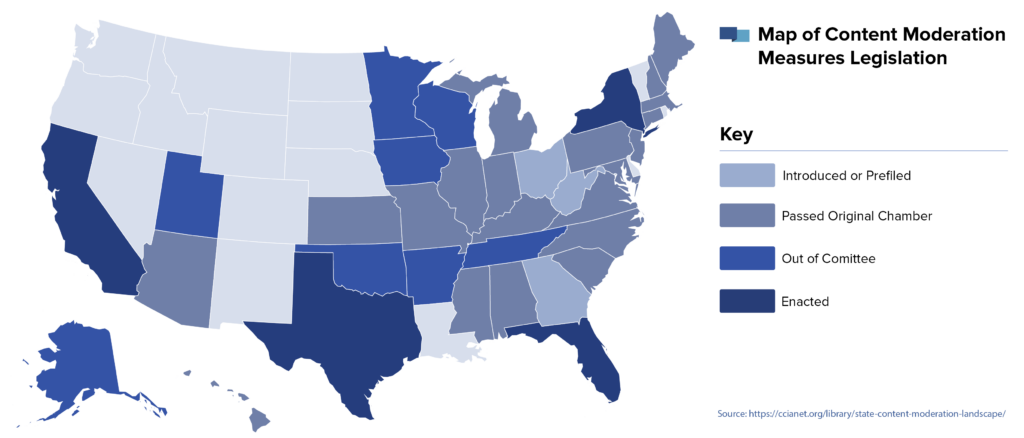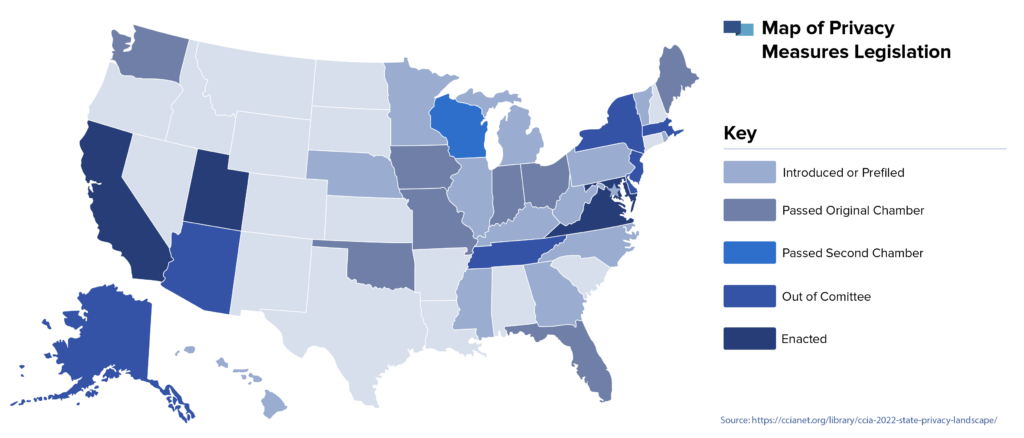UPDATE 4/13/2023: CCIA is planning to update the interactive state legislative maps at least weekly on Friday afternoons. Links to the updated maps are in each section below.
DisCo recently released three posts outlining the current content moderation, data privacy, and competition landscapes, highlighting a number of states that have proposed legislation on these topics. As state legislative sessions kicked off in January, these topics are already producing additional proposals and we anticipate this will continue throughout 2023. The current efforts from state representatives on these fronts are creating a harmful patchwork of likely disparate and potentially conflicting state laws that would only make it harder for companies to serve customers and operate properly. We predict states will continue to legislate on content moderation, data privacy, and competition as similar measures have yet to advance in the U.S. Congress. While the goals of increased competition, supporting data privacy, and effective content moderation are laudable, any proposal must be appropriately tailored so as not to harm the very consumers and businesses it is constructed to benefit. Should Congress move forward on any of these issues, the same principles should apply.
Legislative proposals from the states could create a patchwork of disparate and conflicting laws that would fundamentally shift how businesses operate.
Content Moderation
States such as California, Florida, Georgia, Minnesota, New York, Ohio, South Carolina, and Texas are considering or have enacted content moderation legislation. Many of the bills proposed in these states seek to impose distinct measures geared toward different types of content moderation:
- anti-censorship
- increased content removal
- transparency reporting and disclosure requirements
- disclosure and auditing or testing requirements for algorithms
- child safety

The constraints many of these bills would impose on companies with existing content moderation procedures could be heavily burdensome. This would likely deter new entrants to the market, stifle competition, and negatively impact consumers. Furthermore, these proposals are often in conflict with existing federal law such as Section 230 of the Communications Decency Act, the importance of which DisCo has highlighted. Companies must be able to moderate content online without undue burdens in order to protect the future of free speech and fair competition while also adhering to the best possible outcomes for the consumer.
Learn more about the state content moderation landscape here
UPDATE 4/13/2023: CCIA is planning to update the interactive state legislative map for content moderation at least weekly on Friday afternoons.
Data Privacy
During the past two years states have been quite active proposing data privacy legislation with a degree of success. States ranging from Washington, to Indiana, to New Jersey (and in between) have introduced proposals, however, to date, only five states have passed laws – California, Colorado, Connecticut, Utah, and Virginia. These state proposals have attempted to address a myriad of data privacy foci such as comprehensive consumer data privacy, biometric data and health data, or the collection, processing, storage, and transfer of children’s data.

A growing number of dissimilar laws across the states may introduce new complications rather than effectively addressing the concerns such legislation attempts to solve. Two primary concerns rising from increased state privacy legislation are the (1) confusion among consumers as to what their privacy rights are; and (2) degradation of services due to businesses being forced to meet a range of broad and potentially contradictory compliance obligations. This is particularly troublesome for smaller businesses that tend to have less capacity to study, understand, and comply with detailed requirements of varying laws.
Learn more about the state data privacy landscape here
UPDATE 4/13/2023: CCIA is planning to update the interactive state legislative map for privacy at least weekly on Friday afternoons.
Competition

Finally, multiple states such as Arizona, Georgia, Minnesota, New York, and Rhode Island have recently introduced proposals intended to support competition. These state proposals often focus on the following key issues:
- abuse of dominance
- price discrimination
- reporting requirements for mergers and acquisitions
- monopoly and monopsony
- studies or task forces
- app store payment systems
While legislators crafted these proposals as a means to support consumers and small businesses, they often end up having the opposite effect. Like many of the content moderation and data privacy proposals, the competition proposals often differ from state to state, again creating a regulatory patchwork with disparate regulations that would likely be harder for smaller businesses to comply with. Therefore, these proposals could end up harming not only small businesses by creating additional barriers for them, but also the competitive nature of the marketplace, which could increase costs and leave fewer choices for consumers.
Learn more about the state competition landscape here
UPDATE 4/13/2023: CCIA is planning to update the interactive state legislative map for competition at least weekly on Friday afternoons.

